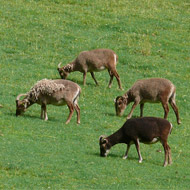
A sheep's ability to endure an internal parasite can strongly influence its reproductive success
Research led by Princeton University and the University of Edinburgh has found that an animal's ability to endure an internal parasite, strongly influences its reproductive success. The finding could provide the groundwork for boosting the resilience of humans and livestock to infection.
The researchers used 25 years of data on a population of Scottish wild sheep to assess the evolutionary importance of tolerance to infection.
First, they looked at the relationship between each sheep's body weight and its level of infection with nematodes - tiny parasitic worms that thrive in the gastrointestinal tract of sheep. The level of infection was determined by the number of nematode eggs per gram of the animal's faeces. While all of the animals lost weight as a result of nematode infection, the degree of weight loss varied widely.
The researchers then tracked the number of offspring produced by each of the sheep, and found that those with the highest tolerance to nematode infection produced the most offspring, while sheep with lower parasite tolerance left fewer descendants.
To measure differences in parasite tolerance, the researchers used statistical methods that could potentially be extended to studies of disease epidemiology in humans.
Andrea Graham, assistant professor of ecology and evolutionary biology at Princeton, said: "For a long time, people assumed that if you knew an individual's parasite burden, you could perfectly predict its health and survival prospects.
"More recently, evolutionary biologists have come to realise that's not the case, and so have developed statistical tools to measure variation among hosts in the fitness consequences of infection."
The study was funded by the Natural Environment Research Council of the United Kingdom and the European Research Council. The findings were published on July 29 in the journal PLoS Biology.
Image (C) Brian Forbes from Kinross, Perth & Kinross (Soay Sheep)



 HMRC has invited feedback to its communications regarding the employment status of locum vets and vet nurses.
HMRC has invited feedback to its communications regarding the employment status of locum vets and vet nurses.